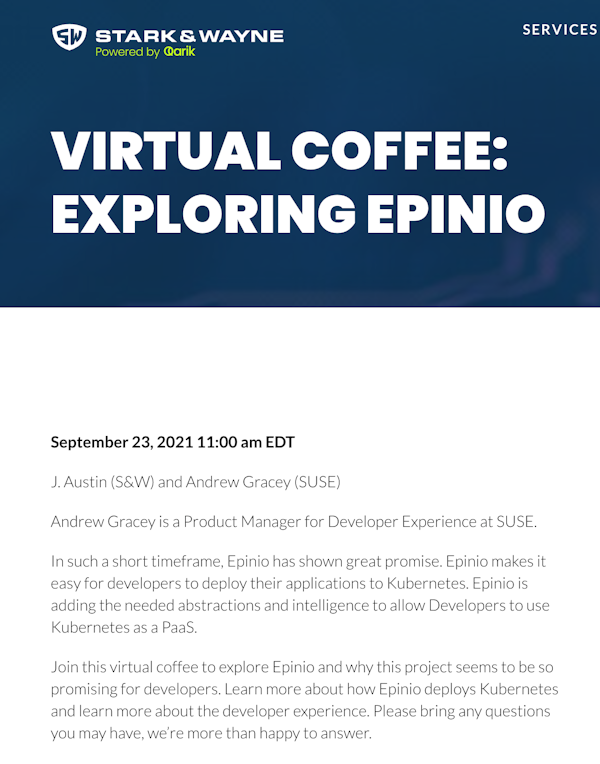On September 23rd, I hosted a Stark & Wayne "Virtual Coffee" with special guest Andrew Gracey from SUSE to discuss Epinio, a rapidly evolving open source platform that takes the sting out of application developer's day-to-day workflow when deploying to Kubernetes.
Wait a sec, what the heck is a "virtual coffee"?
Stark & Wayne's "virtual coffee" events are informal, free-flowing technology discussions we regularly host over Zoom that are free and open to the public via registration (so as not to make it too easy to troll). Attendees can discuss any topic they like, or ask any questions of the crowd they may have (within reason/appropriateness).
Stark & Wayne has a policy of NOT recording virtual coffee events so that participants/attendees don't feel like everything they say or do is a matter of permanent record. We find that this encourages people to be more relaxed and authentic, and removes barriers to free expression, allowing people to ask questions without fear. That's why there isn't a recording of this that I can show you, unfortunately. I wish there was, as it was a great discussion!
The original sign up page was on the Stark & Wayne website, though at the time of this writing (after said event), the form on the page references the next upcoming event since this one occurred in the past (so don't let that confuse you).
Can you tell me a little more about Epinio?
Imagine a PaaS, sitting atop Kubernetes, that lets devs deploy without having to mess with all the icky k8s pieces you'd otherwise have to waste time messing with. That's Epinio in a nutshell.
Because it's essentially an "overlay" on top of k8s, you can still get under the hood and work on the underlying infrastructure at the k8s layer if you have to, but for day-to-day developer workflows, this is a major learning curve and total productivity drag. Why bother when you can abstract all that away so your dev teams don't have to deal with it?
Epinio isn't quite ready for prime-time/production use yet, but in less than a year it's gone from first commit to fairly feature-rich and definitely usable for internal, beta, and/or non-mission-critical scenarios. Its development is funded by SUSE and it's an open source project. My personal opinion at the moment, after my research and discussion on it, is that it's very well managed, has made an astonishing amount of progress in a short time, and has very talented people building it. While it's not production-ready right now, you'd be a fool to ignore Epinio entirely; I'd be willing to bet you a Coke that in less than two years, it will be production-ready and used in some very important and powerful ways.
If its development is funded by a for-profit company (SUSE), what's the long-term business rationale for spending all that money if they don't plan to do something with it?
I can't speak for SUSE of course, but my understanding after speaking with Andrew at the virtual coffee event is that SUSE intends to build this as an open source addition for k8s so that it gains widespread adoption, which will create a market for corporate support contracts over the long haul. So yes, it's built with commercial intent, but not maliciously so whatsoever.
I personally think this makes a whole lot of sense. Nobody can work for free, and to finance continued development you need a revenue stream. This model allows SUSE to contribute to the public good long-term, while simultaneously reducing corporate adoption risk (won't become abandonware) and making Epinio far more attractive than it would be otherwise, given the availability of corporate support contracts (from the developers themselves, no less).
It's also wicked easy to install; it's literally one command and that's it. Seriously.

